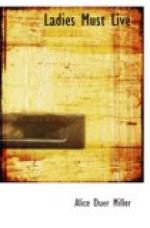“Dear Max,” it said. “I have been pretending so often to write to you for the benefit of my inquiring friends, that I think I may as well do it as a tribute to truth.
“How foolish that was—the night you went away! One gets carried away sometimes by the drama of a situation, without any relation to the facts, and the idea of parting forever from one’s fiance is rather dramatic, isn’t it? I cried all night, and rather enjoyed it. Then in the morning when I woke up, everything seemed to have returned to the normal, and I could not understand what had made me so silly.
“Don’t suppose that because you have gone, I am therefore freed from the disagreeable criticism of which you made such a speciality. Ned comes in almost every day to tell me that he does not approve of my conduct. I am not behaving, it appears, as an affianced bride should. Don’t you like to think of Ned so loyally protecting your interests in your absence? His criticisms are, I suppose, based on the attentions of a nice little boy just out of college, who calls me ‘Helen,’ and writes sonnets to me which are to appear in the most literary of weeklies. Look out for them. They are good, and may raise your low estimate of my charms. The best one begins:
“When the blond wonder first on Paris dawned—
“Isn’t that pretty?
“Write to me. At least send me a blank envelope that I may leave ostentatiously on my desk.
“Yours at the moment,
“CHRISTINE.”
Riatt’s first thought on laying down the letter was: “Hickson never in the world objected to any little poet just out of college, and she knows it very well. It’s Linburne he is worried about—Linburne, whose name she does not even mention.” And how absurd to attempt to make him believe she had cried all night. That was simply an untruth. Yet oddly enough, it came before his eyes in a more vivid picture than many a scene he had actually witnessed.
A few minutes later he went to the club and looked up the literary weekly of which she had spoken. There was no sonnet in it, but the issue of the next week contained it. Riatt read it with an emotion he could not mistake. It brought Christine like a visible presence before him. Also it made him angry, to have to see her like this, through another man’s eyes. “Little whelp,” he said, “to detail a woman’s beauty in print like that! What does he know about it anyhow? I don’t believe for one second she looked at him like that.”
The sonnet ended:
She turned, a white embodiment of joy,
And looking on him, sealed the doom of
Troy.
He was roused by a friendly shout in his ear. “Ho, ho, Max, reading poetry, are you? What love does for the worst of us!” It was Welsley, who snatched the paper out of his hand, running over the lines rapidly to himself: “Hem, hem, ‘carnation, alabaster, gold and fire.’ Some queen, that, eh? Have you had your dinner? Well, don’t be cross. There’s no reason why you shouldn’t read verse if you like. And this young man is the latest thing. My wife says they are going to import him here to speak to the Greek Study Club.”




